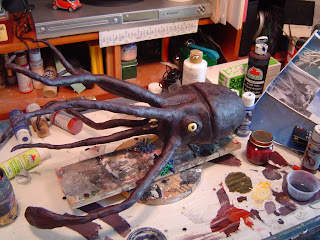Last week I showed the first tentacle made for the squid and soon after that, 6 more were made. I'm only going for 7 tentacles out of 10 at this point, though I might add more later on. The reason for that is that I wasn't sure if you were going to see them all during the flashes of lightning. After a few tests, it turns out that you can!
Once the tentacles were baked and hardened, all the joints and gaps were filled with self-hardening clay. Forgetting that is has that quality, the clay cracked like crazy when it dried because of the rigid structure. So I filled in the cracked and joints with epoxy putty. (Which results in the different shades in the picture below).
The color of the squid in the movie is really hard to determine. After some studying of the dark film footage, and some consideration of my own preference, I decided to paint the squid a dark purple. I've always associated the squid with being a red color, after seeing the "sunset squid" lost footage. I compromised that image by darkening it and I got purple. The reason also having it purple is so the viewer can distinguish the squid from the backdrop a tad easier because of the difference in hues. Just for fun, I also painted the eye with glow-in-the-dark paint!
The squid is currently being installed and at some point I should get started on the characters. After that installation of the effects will go in and some "Mod Podge Water" will be drenched all over the set.
Since the entire scene is static, I've come up with a way of giving the illusion of movement during the lightning flashes. In a couple of tests that I did, I rigged two strobe lights, turned on and off by a motorized cam, on two opposite sides of the squid. I set them at different flash speeds and the results create a striking look (no pun intended). The rapid change between the light sources looks incredible and it gives it the slight illusion of movement.
In addition to working on the squid, I've also finally finished my first door to the attraction. My original entrances to the table attractions have always been strips of trashbag. While they worked for their time, they don't seem to last that long and aren't the most stremlined and slick looking "doors". This time I've devised operation sliding doors (I was originally going to employ a set of double doors, only to find that they take up a lot of room). Once I had a smooth working door, I figured out how to make it run on it's own. The goal was to have the door open at the push of a button, stay open at time interval, and close all automatically on it's own. However, the propulsion of the door was the hardest part. I went through 3-4 versions of a motor set up and the best one was loud, noisy, jerky, and broke really easily. That doesn't help when I need smooth and quiet operating doors. Basically I had the sliding door on a track being pulled by fishing line by two motors. A timer relay would turn either motor on, opening or closing the door.
I later compromised and not have the entire door motorized. To put it in simpler terms, the sliding door is on a counterweight, push the door open and the weight pulls it closed. However, I added a little more to it. Once the door is open via a line pulled by the viewer entering or exiting, the cable operating the door has a catch that comes in contact with a latch, like a zip-tie. A motor allows this contact to happen because the latch was lowered by the motor once a reed switch triggered the relay powering the motor. Once the timer expires, the motor power is cut allowing a lever to drop, raising the latch and releasing the cable catch allowing the door to close via gravity on the counterweight. It sounds pretty confusing without and visual reference, but I might do a video demonstrating the door since it is a clever piece of mechanics that I've done.
This kind of operation is virtually silent and it's actually safer since the door can be stopped from closing easily because it's only on a counterweight; while if I had the old motorized door, the door would close whether or not someone was in the doorway.
I later compromised and not have the entire door motorized. To put it in simpler terms, the sliding door is on a counterweight, push the door open and the weight pulls it closed. However, I added a little more to it. Once the door is open via a line pulled by the viewer entering or exiting, the cable operating the door has a catch that comes in contact with a latch, like a zip-tie. A motor allows this contact to happen because the latch was lowered by the motor once a reed switch triggered the relay powering the motor. Once the timer expires, the motor power is cut allowing a lever to drop, raising the latch and releasing the cable catch allowing the door to close via gravity on the counterweight. It sounds pretty confusing without and visual reference, but I might do a video demonstrating the door since it is a clever piece of mechanics that I've done.
This kind of operation is virtually silent and it's actually safer since the door can be stopped from closing easily because it's only on a counterweight; while if I had the old motorized door, the door would close whether or not someone was in the doorway.






